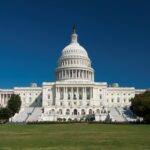TFAH Celebrates National Public Health Week
April 1-7, 2024 is National Public Health Week. This year’s theme is Protecting, Connecting and Thriving: We Are All Public Health and TFAH is proud to celebrate and recognize all of the individuals, organizations, and agencies that work to protect health, advance equity, and promote well-being in communities nationwide.
Public health workers are on the front lines helping communities prevent chronic diseases and substance misuse, defending against disease outbreaks, protecting our water supply, and preparing for and responding to natural and human-caused disasters. Their work is constant and critically important to improving and protecting the health and safety of all communities.
Examples of the contributions of the public health system to advancing Americans’ health are many, including:
- Increasing life expectancy – Americans’ life expectancy steadily increased during the 20th century and through 2009 the first decade of the 21st century, was flat between 2010 and 2018 the next decade, and declined during the COVID-19 pandemic. The latest available data, for 2022, showed a slight rebound in the life expectancy trendline.
- Delivering vaccines – the 20th and beginning of the 21st centuries saw substantial decreases in vaccine preventable diseases such as measles and polio thanks in part to public health programs to ensure vaccine access, particularly in underserved communities.
- Promoting maternal and infant health – programs to support pregnant people have created improved access to prenatal, post-partum, and infant healthcare, but more work needs to be done to address racial and ethnic disparities in maternal and postpartum health outcomes.
- Helping people who smoke quit – the initial phase of the Centers for Disease Control’s Tips from Former Smokers campaign (2012 – 2018) helped more than one million people successfully stop smoking, which has prevented an estimated 129,000 early deaths and saved approximately $7.3 billion in smoking-related healthcare costs.
- Protecting health during extreme heat – extreme heat threatens the public’s health. Several U.S. jurisdictions have heat response plans, and others are working on creating such plans. Heat response plans outline actions to mitigate the impact of the increasing number and intensity of heatwaves.
“Public health practitioners work tirelessly to prevent disease, prepare for and respond to disasters, address health disparities, and create healthy communities. This vital work deserves support and requires investment to fully fund the public health infrastructure and its workforce,” said Dr. J. Nadine Gracia, M.D. MSCE, President and CEO of Trust for America’s Health.
Most of the money spent on healthcare in the U.S. goes toward preventable illnesses and injuries. Increased and sustained funding for public health would be an investment in prevention and would help to reduce healthcare spending over time. TFAH has called for $4.5 billion annually to adequately fund public health infrastructure across the country. As the White House and Congress work on FY 2025 appropriations, lawmakers should support the full range of work the CDC and health departments do every day to keep communities safe and healthy.
A different public health theme is highlighted each day during National Public Health Week. Visit the American Public Health Association and to access information and resources on each topic.

